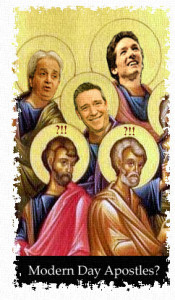Nathan Busenitz serves on the pastoral staff of Grace Church and teaches theology at The Master’s Seminary in Los Angeles. In he writes:
 Are there apostles in the church today?
Are there apostles in the church today?
Just ask your average fan of TBN, many of whom consider popular televangelists like Benny Hinn, Rod Parsley, and Joel Osteen to be apostles. (Here’s one such example [see page 22].)
Or, you could ask folks like Ron, Dennis, Gerald, Arsenio, Oscar, or Joanne. They not only believe in modern-day apostleship, they assert themselves to be apostles.
A quick Google search reveals that self-proclaimed apostles abound online. Armed with a charismatic pneumatology and often an air of spiritual ambition, they put themselves on par with the earliest leaders of the church.
So what are Bible-believing Christians to think about all of this?
Well, that brings us back to the title of our post:
Are there still apostles in the church today?
At the outset, we should note that by “apostles” we do not simply mean “sent ones” in the general sense. Rather, we are speaking of those select individuals directly appointed and authorized by Jesus Christ to be His immediate representatives on earth. In this sense, we are speaking of “capital A” apostles – such as the Twelve and the apostle Paul.
It is these type of “apostles” that Paul speaks of in Ephesians 2:20; 3:5); 4:11 and in 1 Corinthians 12:29–30. This is important because, especially in Ephesians 4 and in 1 Corinthians 12–14, Paul references apostleship within the context of the charismatic gifts. If “apostleship” has ceased, it gives us grounds to consider the possibility that other offices/gifts have ceased as well. If the apostles were unique, and the period in which they ministered was unique, then it follows that the gifts that characterized the apostolic age were also unique.
The question then is an important one, underscoring the basic principle of the cessationist paradigm – namely, the uniqueness of the apostolic age and the subsequent cessation of certain aspects of that age.
There are at least five reasons why we believe there are no longer any apostles in the church today (and in fact have not been since the death of the apostle John).
1. The Qualifications Necessary for Apostleship
First, and perhaps most basically, the qualifications necessary for apostleship preclude contemporary Christians from filling the apostolic office.
In order to be an apostle, one had to meet at least three necessary qualifications: (1) an apostle had to be an eyewitness of the resurrected Christ (Acts 1:22; 10:39–41; 1 Cor. 9:1; 15:7–8); (2) an apostle had to be directly appointed by Jesus Christ (Mark 3:14; Luke 6:13; Acts 1:2, 24; 10:41; Gal. 1:1); and (3) an apostle had to be able to confirm his mission and message with miraculous signs (Matt. 10:1–2; Acts 1:5–8; 2:43; 4:33; 5:12; 8:14; 2 Cor. 12:12; Heb. 2:3–4). We might also note that, in choosing Matthias as a replacement for Judas, the eleven also looked for someone who had accompanied Jesus throughout His entire earthly ministry (Acts 1:21–22; 10:39–41).
Based on these qualifications alone, many continuationists agree that there are no apostles in the church today. Thus, Wayne Grudem (a continuationist) notes in his Systematic Theology, “It seems that no apostles were appointed after Paul, and certainly, since no one today can meet the qualification of having seen the risen Christ with his own eyes, there are no apostles today” (p. 911).
2. The Uniqueness of Paul’s Apostleship
But what about the apostle Paul?
Some have contended that, in the same way that Paul was an apostle, there might still be apostles in the church today. But this ignores the uniqueness with which Paul viewed his own apostleship. Paul’s situation was not the norm, as he himself explains in 1 Corinthians 15:8-9. He saw himself as a one-of-a-kind anomaly, openly calling himself “the last” and “the least” of the apostles. To cite from Grudem again: Continue reading

 Pastor John, “is the Church in which you are a member under an Apostle?” He said that if it was not, it was not a legitimate Church and he would strongly urge me to leave my present Church and instead find one that looks to a present day Apostle as its head. What should I do with all this?
Pastor John, “is the Church in which you are a member under an Apostle?” He said that if it was not, it was not a legitimate Church and he would strongly urge me to leave my present Church and instead find one that looks to a present day Apostle as its head. What should I do with all this? God’s love for the world was demonstrated by the giving of His Son so that all who believe in Him will in no way perish, but instead, have everlasting life.
God’s love for the world was demonstrated by the giving of His Son so that all who believe in Him will in no way perish, but instead, have everlasting life.